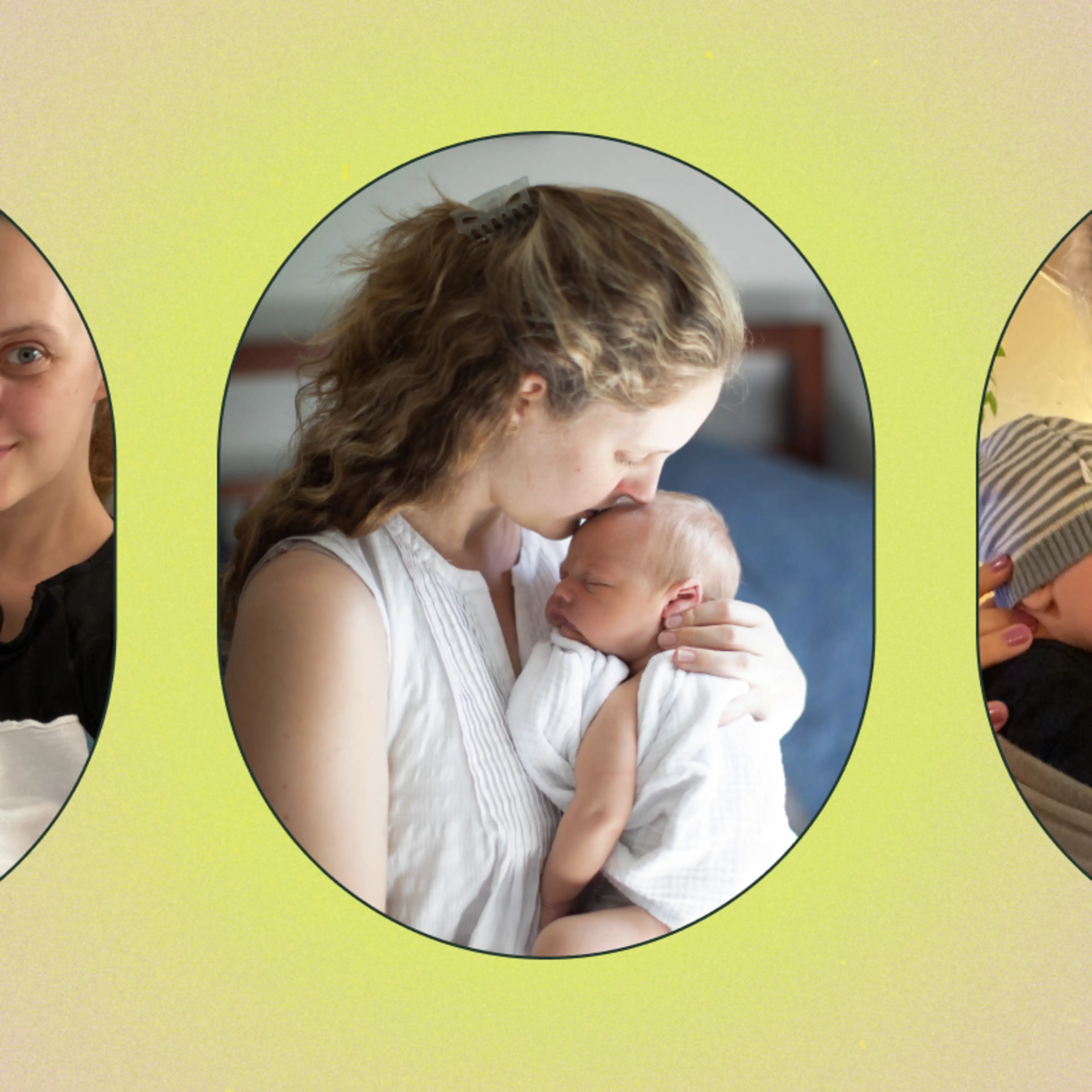We’ve come a long way since Skinny Bitch and the you-better-bounce-back-after-baby rhetoric that was all the rage in the early aughts. More celebrities are openly celebrating their less-than-perfect postpartum bodies. Societally, we’re starting to focus less on how new moms look and more on how they feel, and we are no longer blindly accepting that our bodies have to be a certain size in order to feel good about ourselves.
But that doesn’t mean everyone in your life has joined the body acceptance movement. As one newly postpartum mom shared in a now-viral TikTok, many of our own almond moms (those who are stuck in toxic diet culture mode) are, unfortunately, still wreaking havoc on body image in the form of “helpful” gifts like a scale and an entire folder of body measurement tracking sheets. (Can you feel our eyes rolling?)
No matter how far you’ve come with your own body acceptance, these kinds of comments can feel like a punch to the gut. Maybe you grew up with toxic ideas around food that affected your relationship with your body. Or maybe this is your first foray into the world of people commenting on parts of you that are, frankly, none of their business.
Either way, it’s never okay for someone—even (and especially!) those closest to you—to talk about your body. Full stop. That’s why we chatted with Monique Bellefleur, a therapist specializing in perinatal mood disorders, body image issues, and eating disorders, for some tips on how to emotionally handle unwelcome body image comments—and shut them down permanently.
Take a Minute to Validate Your Feelings
Whether you’ve just had a baby, you had kids years ago, or you've never even considered having a baby—your body is not up for public discourse. But when you’re newly postpartum, any unwanted comments about your body can leave you feeling particularly vulnerable, even if your appearance is the furthest thing from your mind. Because why should you care? You have a brand new baby to nurture and an entirely different mom identity that you're figuring out. Still, it can be a bit of a shock if a negative body comment slips into the conversation, even if it seems well-intentioned or the person downplays their comment as harmless.
“Even if you’re in a place of trying to work on body acceptance, it’s important to validate for yourself that type of comment or that type of gesture can still hurt,” says Bellefleur. “Don’t judge yourself for feeling that way, and also know that you don’t have to let that comment or that hurt drive how you decide to act,” she says. “It doesn’t mean you have to start dieting, it doesn’t mean you have to start hating your body.”
Check-in with Your Values
Before firing back with a razor-sharp comeback, take a beat to reflect on your own set of values around body image, self-esteem, and new motherhood. Where are you on your body-acceptance journey? Why do you think it’s important to stay the course? And how does being a new mom factor into all of that?
“Maybe that is a value about modeling for your child how to have a positive relationship with your body and not passing on the intergenerational trauma of dieting and body hate,” says Bellefleur. “Or maybe it's that you are really trying to focus on caring for your body, especially during the delicate postpartum time,” she adds.
Or maybe it has nothing to do with your body and everything to do with pouring yourself into the new responsibilities of a first-time mom. “It could be that you don’t want to be focusing on changing your body because you're focusing on parenting a newborn.”
By getting clear about your own values, you can more confidently explain to your loved one why you will not be engaging with any negative body talk. Period.
Speak Your Truth
It’s time to muster your inner strength, because calling someone out—especially your mom or another close family member—can be nerve-wracking and extremely difficult. Simply put, their comments cut more deeply. They are supposed to show you unconditional love, and here they are, essentially telling you that their love is actually dependent on your body shrinking. They need to know that these types of comments are hurtful for a new mom (or anyone who is a living, breathing human!). This is your chance to educate them.
“You can say something along the lines of, ‘I understand that you’re trying to be helpful, and I really don’t find that helpful right now,’” says Bellefleur. “Or, ‘I understand that you have good intentions, and that actually really hurts my feelings,” she says. “It’s good feedback for anybody to learn that it’s not okay to comment on someone else’s body.”
If you’re feeling up to it, you can then lay a few ground rules to help this person be a decent citizen out in the world. You can say, “Never comment on somebody else’s body unless it’s something they can change within two minutes, like you have spinach in your teeth or your hair is sticking out,” says Bellefleur. “Otherwise, don’t comment positively or negatively on somebody’s body because it can be triggering in ways you might not understand.”
Then, just sit back and let them soak in your wisdom, because you are not responsible for how this person handles your feedback.
Set Your Boundaries
This part can be hard, especially for the people-pleasing, conflict-averse among us. Still, part of becoming a mom is learning how to set boundaries. (Trust us, it will serve you well). So, the next time your almond mom pokes your midsection or asks if you really need that third piece of pizza, have this script in your back pocket.
“You can say, ‘thanks, but no thanks, I’m really trying to model for my own children that we don’t need to change our bodies to be worthy, so that’s not something I’m focusing on,’” says Bellefleur. You could even say something as simple as, “I’m really not comfortable talking about my body,” if someone is making a comment about you, she says. Or, you could say something non-committal like, “Changing my body right now is the least of my priorities.”
If you really want to shut it down hard, you might say, “‘As a household, we are not going to talk about bodies or diets,’” says Bellefleur. “It depends on how firm you want to be with your boundary and what you want to say.”
Consider Talking With a Therapist
For people who grew up in households where body shaming, dieting, and disordered eating were the norm, these types of comments and gestures can go much deeper. If that’s the case, it’s important to acknowledge where you’re coming from, know that it doesn’t have to be that way, and get help if you are struggling to deal with the feelings that are coming up for you.
“If you grew up in that environment, it makes a lot of sense that you might have developed a disordered relationship with food or body image, and also know that it’s possible to unlearn that message that you’ve soaked in throughout all those years,” says Bellefleur. “Never hesitate to reach out for support from somebody who works in the field of disordered eating, negative body image, or perinatal mental health, because it’s possible to have a different relationship with food and body image and not pass on those same messages to your own kids.”
Continue Working Towards Body Acceptance
If a negative comment about your body is pinging around your brain like a pinball, it might be time to practice a little self-acceptance. You can start by focusing on the amazing thing your body just did—growing a human, then birthing that human, and the ways in which your body is now helping you to take care of your baby, says Bellefleur.
Then, as negative body image thoughts pop up, you can notice them and let them pass. “You can stop and say, ‘I’m having a negative body image thought right now,’ then let it float away without going down the rabbit hole of, ‘Oh, I really hate the way my stomach looks,’ or ‘Oh my god, that means I need to start dieting,’” says Bellefleur. “When you can get space from the thought, it doesn’t drag you down,” she says.
Another way to boost your body image is the old fake-it-til-you-make-it routine. “Try to challenge yourself to engage in inner dialogue that might even be forcefully opposite from how you feel in order to start to change [those negative thoughts],” says Bellefleur. For example, if you’re going to take a shower and you don’t like the way your belly looks in the mirror, Bellefleur suggests rubbing your stomach and saying, “Wow, thanks for helping me carry my baby” or “This belly has been through so many things” or even something that may feel a bit silly like, “I love you, belly.”
Standing up for yourself—even to your own inner voice—isn’t always easy. Setting boundaries is a process. Being a cycle-breaker takes courage. Just know that every single mom who has grappled with their body image—the comments, the disapproving looks, the self-hatred—is right there with you as you push back against the same, tired messages we’ve all internalized in a million different ways. Be smaller. Bounce back. Stay attractive. Here’s to having the confidence to quiet the voices in your life that no longer serve you.












